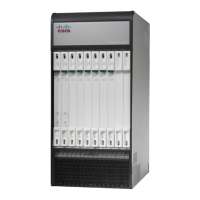IPv6 Support for BGP MPLS VPNs
Overview
The supports VPNv6 as described in RFC 4659 – BGP-MPLS IP Virtual Private Network (VPN) Extension
for IPv6 VPN.
An IPv6 VPN is connected over an IPv6 interface or sub-interface to the Service Provider (SP) backbone via
a PE router. The site can be both IPv4 and IPv6 capable. Each VPNv6 has its own address space which means
a given address denotes different systems in different VPNs. This is achieved via a VPNv6 address-family
which prepends a Route Distinguisher (RD) to the IP address.
A VPNv6 address is a 24-byte quantity beginning with an 8-byte RD and ending with a 16-byte IPv6 address.
When a site is IPv4 and IPv6 capable, the same RD can be used for the advertisement of both IPv4 and IPv6
addresses.
The system appends RD to IPv6 routes and exchanges the labeled IPv6-RD using the VPNv6 address-family.
The Address Family Identifier (AFI) and Subsequent Address Family Identifier (SAFI) fields for VPNv6
routes will be set to 2 and 128 respectively.
The IPv6 VPN traffic will be transported to the BGP speaker via IPv4 tunneling. The BGP speaker advertises
to its peer a Next Hop Network Address field containing a VPN-IPv6 address whose 8-octet RD is set to zero
and whose 16-octet IPv6 address is encoded as an IPv4-mapped IPv6 address (RFC 4291) containing the IPv4
address of the advertising router. It is assumed that only EBGP peering will be used to exchange VPNv6
routes.
Support for VPN-IPv6 assumes the following:
•
Dual Stack (IPv4/IPv6) routing
•
IPv6 pools in VRFs
•
BGP peering over a directly connected IPv4 interface
See the figure below.
Figure 7: IPv6-RD Support for VPNv6
Sample Configuration
This example assumes three VRFs. VRF 1 has only IPv4 routes, VRF f2 has both IPv4 and IPv6 routes, and
VRF 3 has only IPv6 routes.
Figure 8: VPNv6 Sample Configuration
Configure VRFs.
ip vrf vrf1
exit
ip vrf vrf2
exit
ip vrf vrf3
exit
ASR 5500 System Administration Guide, StarOS Release 21.5
244
BGP MPLS VPNs
IPv6 Support for BGP MPLS VPNs

